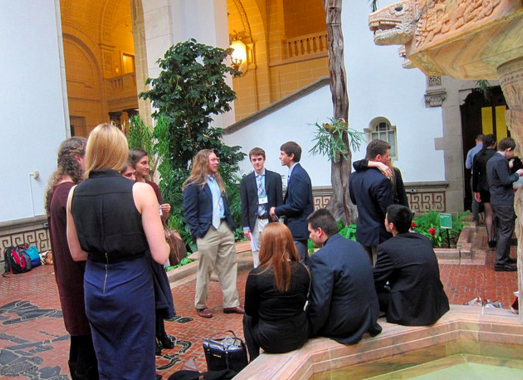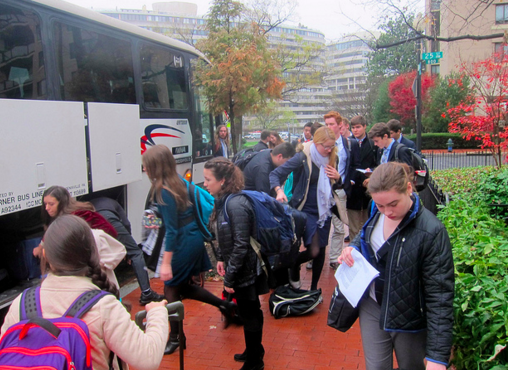Friends Students Experience the Grit and Glory of Diplomacy at MOAS
Weekly Article

Students congregate at the OAS building in Washington, D.C. before opening ceremonies on Wednesday, December 2, 2015.
Every year in early December, Friends sends twenty students to Washington, D.C. to participate in the Model Organization of American States (MOAS) conference. MOAS models the Organization of American States General Assembly, an organization similar to the United Nations, but instead focused solely on the countries in the American Hemisphere. Each school that attends represents a member nation, and is in charge of arguing, advocating, and negotiating for its country’s and the hemisphere’s best interests. This year, Friends represented Uruguay and Haiti. The Chief Delegate for Uruguay was Andrew Jaworksi ’17, while the Chief Delegate for Haiti was Jodi Lessner ’16. Each delegation consisted of ten student delegates, including the Chief Delegate, split up between five different committees that each discussed a different issue facing the hemisphere.
The process to become a delegate for Friends’ delegations is a competitive one. Students were asked to write a position paper outlining one issue facing their respective nation as well as solutions and measures that could be taken by the OAS to ameliorate the situation. Additionally, students had to complete over fifteen quizzes that tested basic knowledge on not only their respective countries, but also the entire hemisphere. Emilio Ergueta ’16, co-clerk of the Friends MOAS club and delegate from Uruguay in the Second Committee, commented on the admissions procedure, “The process to get into MOAS is very difficult. It requires a lot of hard work and understanding of the difficult problems we face as a hemisphere. Students are asked not only for basic knowledge of these problems but also to give a detailed proposal of what they would do to make a positive change or to fight the problems.” Once students were admitted to the club, they chose the committee that they wanted to work on. The clerks, though, chose who would serve as the head or alternate delegate, as well as the Chiefs of Delegation. “We like to give young students a chance to run for leadership positions and also like to pair more senior members of the club with those who are new to it,” said Ergueta.
This year, before the conference began, Friends students had the unique opportunity to learn firsthand about the issues facing one of the WFS-assigned countries, specifically Uruguay, from the Uruguayan Minister Counselor and Alternate Representative to the OAS, Estela Queriolo de Tealdi. On the morning of Wednesday, December 2, at a meeting in the Uruguayan embassy, Friends students had the chance to ask questions to a real ambassador ranging from education to protection of human rights in business. Speaking from her perspective as a diplomat, Queriolo de Tealdi summed up the drive that all delegates have in their work in the OAS, “The most important thing we have is the same right to raise our voice.”
Keeping with the new OAS slogan, “More rights for more people,” the topics discussed at this MOAS ranged from “Migration in the Americas”, debated in the General Committee, to “Juridical and Political Affairs” in First Committee, to “Children and Youth” in Fourth Committee. Delegates from each country were asked to work with other delegates in drafting resolutions that would lay a foundation to provide solutions for issues in the hemisphere. In each of these committees, the discussion and debating procedures used by the actual OAS were utilized, teaching students about bureaucracy and diplomacy.
One of the unique aspects of MOAS is the fact that all procedures are run almost entirely by students who were elected the previous year. Daniel Scott, faculty sponsor of the MOAS club, sees this as the conference’s defining feature. When asked to sum up the conference in one word he said, “Autonomy. The way it [the conference] is so self-directed and student-directed makes it a good experience and one that is very unique to anything that you get at school.”
This year, Friends not only brought delegates to the conference, but also authorities to enforce correct diplomatic procedure. After winning elections last year, Joslyn Gardner ’16 and Simone Veale ’17, were elected as Vice Chair in the General and First committees respectively. As Vice Chair, Gardner and Veale were asked to help delegates write resolutions as well as lead debates on proposals. Gardner and Veale drew upon their experience as Chief Delegates in previous years. While initially excited to be on the other side of the table, Gardner soon realized that the two experiences at MOAS could not be more different, “I think the most exciting part about the conference was being on the other side. It was an eye-opening experience to see the inner workings of the MOAS. But we never went through training about how to run a session except for the reading material we were emailed and the brief orientation we had before the conference began. The coordinator also came in last minute and completely rearranged everything which didn’t help. But overall, being able to run meetings was fun and empowering. It was nice to sit there and watch other people work and debate for once.”
Passing the torch onto the next generation of leaders from Friends, Gardner coached both Katy Shannon ’17 and Sadie Proud ’17 on their speeches of candidacy for next year’s leadership positions. Shannon ran for General Committee Vice Chair, and came in second out of a qualified base of candidates. Proud ran for MOAS President. Out of ten candidates for both President, and Secretary General, she was the only female. After a three-minute speech and two rounds of elections, Proud came out victorious, receiving the majority of votes needed to secure her position of MOAS President for next year’s 35th Model OAS conference. “I was really focused on my platform at the time, so I wasn’t preoccupied with being the only female candidate. Looking ahead to next year, though, I will certainly consider whether there are barriers to leadership that should be considered. The best part of MOAS is meeting new people from around the world and getting to explore the issues from different perspectives. Overall, MOAS is an incredible organization, and I’m excited to serve in my new role,” Proud commented.
Everyone had different favorite and least favorite moments of the conference. For the most part, a highlight of the conference was the diversity in students participating. Students were able to meet other students from not only across the United States, but also the world. Caroline Wren ’16, delegate from Haiti in the Second Committee saw this as the defining feature of her time at MOAS, “It was my first time in MOAS and I had a wonderful time. I wasn’t sure how it was going to turn out but I was in a really good working group and we worked really well together to write our proposal on increasing border security for small firearms trafficking.” Another favorite part of the conference was the ability to dress up in business outfits and discuss politics like real diplomats. Kelly Hartwick ’16, delegate from Uruguay in the Fourth Committee, commented, “I think MOAS is a great experience to not only learn about politics, but to get a glimpse as a high schooler of what it’ll be like as a professional in the real world.”
Katy Shannon ’17, delegate from Haiti in the General Committee, said that her favorite part of the conference was getting to use her Spanish language skills, “My favorite part of MOAS was meeting people from all over the country and all over the Americas and discussing important issues with them. I loved practicing my Spanish with my working group. We had a fun time.” Time to practice language skills was utilized by more than just Shannon. Javier Ergueta, Faculty Sponsor of MOAS, concurred, “I loved seeing so many Latin American schools at the conference this year. They made it a truly multicultural event. Cecilia [Ergueta ’18] found herself speaking in French, Spanish and even German simultaneously to different people!”
The multilingual aspect of the event was both a benefit and a downfall for some, especially those who do not speak or take Spanish. Sam Huo ’18, delegate from Haiti in the Second Committee, discussed the difficulty of understanding what was going on during the closing ceremonies, “The OAS ambassador from Costa Rica spoke solely Spanish in a 70 percent English speaking room without a translator so most people had no idea what he was talking about for 40 minutes.” Another complaint about the conference was the limited time given to debate the resolutions that had been written the day before. Javier Ergueta believed the conference could be improved if this issue was fixed, “The best part for me was to see hard work recognized: How our good proposals won approval by delegations from all over the hemisphere. [However] I’d like to see the conference become even more substantive, with our students developing proposals that could actually be carried out by the OAS!”
Each day after the conference ended, students were given the opportunity to explore D.C., an experience that is often a highlight. For most, this is an opportunity to explore all that D.C. has to offer, whether it is food, museums, monuments, or walking around. Scott, commented on the benefits of the free time saying, “D.C. has a wealth of cultural opportunities and hopefully you are taking advantage of them as a part of this trip.”
Kelly Hartwick ’16, delegate from Uruguay in the Fourth Committee, summed up her experience, as well as that of many others, at what will be her final MOAS conference, by saying, “I want to stay in DC forever and continue to do MOAS. I had that great of a time.”

































